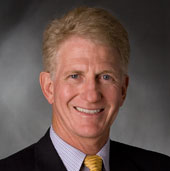 "Ten years from now, we'll be talking about behavioral change methods, not the technology."
"Ten years from now, we'll be talking about behavioral change methods, not the technology."
That was a prediction Don Jones, vice president of global strategy and market development for Qualcomm Life, the healthcare connectivity division of San Diego-based telecommunications firm Qualcomm, made Friday at the University of Southern California's seventh annual Body Computing Conference in Los Angeles.
For now, however, digital health is an industry area very much in flux, a young segment looking for its footing, as some other speakers suggested.
A lot of money is being lost today in companies that have interesting ideas but lack solid business models, said Wain Fishburn Jr., a partner in Palo Alto, Calif., law firm Cooley LLP. "Ultimately, a ton of money is going to be made on a few big winners," he said.
Those winners will not necessarily be the most innovative in terms of technology, however. Instead, they could represent breakthroughs in process design. "Digital medicine and the approach it's going to take to healthcare is simply going to amplify the technologies we have and disrupt healthcare," said Fishburn, who advises Silicon Valley startups.
In fact, Fishburn believes that some innovators are bashing physicians too much, and said that needs to change. "A lot of what digital health is going to be will be elevating the doctor's role," he said. It should help physicians make better use of their time, rather than diminishing their stature.
Brian Russell, CEO of Zephyr Technology Corp., the Annapolis, Md.-based maker of the BioHarness wireless vitals sensor, said nurses actually will be the users of digital technology in clinical settings 90 percent of the time. They already are more hands-on with patients than are physicians, he noted.
More importantly, according to Oklahoma City cardiologist Dr. David Albert, founder and chief medical officer of smartphone ECG maker AliveCor, digital technologies will help make clinicians more efficient in treating an aging population with conditions like chronic obstructive pulmonary disorder.
"We don't have enough doctors, we don't have enough nurses, to treat all of these cases of COPD," said Albert. Sensors can help make COPD management more like diabetes management, with patients testing and monitoring themselves outside of the doctor's office. "It won't be easy," Albert said, "but the outcomes will be better."
Already, Jones said, patients are starting to bring their own data to physicians, putting digital health on the verge of a "tipping point" toward widespread adoption.
The data is going to matter more than ever, but it will require a lot of integration, Russell said. This integration will be "fundamental" to better care, he said, but so will technology to interpret all the new data generated from wearable and portable devices. "How much information is too much information?" he wondered.


















